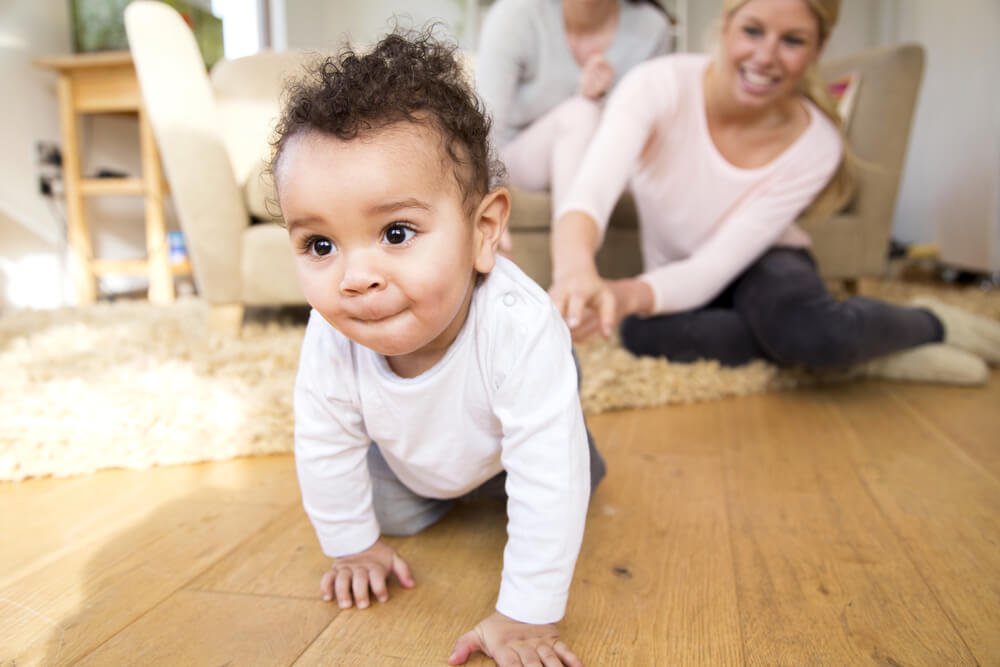All parents, specially first-timers, are eager for information that will help them make sure their children are having a satisfactory development. Although every baby develops differently, keeping a record of milestones provides a useful framework for tracking and monitoring a child’s progress in motor, language, and social skills.
What to expect and record during your baby’s first year?
At the very beginning, it may seem that your baby does nothing but cry, eat, and sleep. But you should know that since their first weeks of life, your baby is developing alertness, responsiveness, and motor skills. Watch closely and you’ll be able to witness and enjoy the fascinating progress that your little one is actually experiencing.
0-1 month: By the end of the first month, you’ll see that your baby will be significantly more alert and responsive than when they were born. Their body will begin to move more smoothly and with greater coordination. In addition, you’ll be pleasantly surprised and gratified when you realize that they are reacting to your voice and watch you as you hold them.
From there on, you’ll realize the value of keeping up with and tracking your baby’s growth and development milestones. A few things to look for:
1-3 months: By the end of this period, your little one will have made a dramatic transformation from a sleepy newborn to an active and responsive infant. They will leave behind many of their newborn reflexes and will have more control of their body. They’ll discover their hands and will be entertained by inspecting and watching them move. Your baby will be able to visually identify and follow bright or high-contrast objects when moved slowly.
4-7 months: During this period there will be dramatic changes in terms of your child’s development. Your baby will learn to coordinate their emerging perceptive abilities (the use of senses like vision, touch, and hearing) and their increasing motor abilities to develop skills like grasping, rolling over, sitting up, and possibly even crawling.
8-12 months: Your baby will become mobile! This is thrilling, but also challenging for parents, as their baby will be eager to move from place to place by creeping, crawling, scooting on their bottom, or even taking their first steps. Their new mobility will also be accompanied by lots of sounds. In this phase, it is typical to hear babbling, mimicking, pointing, and maybe even a first word or two.
12-15 months: Toddlers spend a lot of time trying to understand what different things do and what they can do with them. Your little one will build small block towers and then knock them down. Toddlers like to explore and they feel safer when their moms are nearby. At this stage, your little one may start to show empathy, an important ability to create relationships.
15-18 months: At this age, play is a fundamental part of the development of your little one’s imagination, thinking process, and creativity. They’ll especially enjoy games like finding lost objects or playing to point out body parts. Regarding emotions, your child will have developed a strong attachment to the people they love and will give many kisses and hugs. They may also experience anxiety when they’re separated from mom.
Of course, there are too many milestones to mention here. That’s why we encourage new parents to keep track of their baby’s growth and developmental progress on a continuous basis. Keeping a record of milestones, through a specialized app, like Kinedu, will not only provide great memories, but will empower parents to continuously identify ways to support and boost their baby’s progress and confidence.
It goes without saying that babies develop at different rates and it’s hard to predict whether these advances or delays are short term or permanent. Permanent delays don’t happen often and a delay in one area may be offset by advances in another.
“There’s a very broad range of what is considered normal or typical,” explains Cristina Canelas, a child psychologist. “Keeping a record of progress on all fronts –communication, motor, and social– will help you track and remember your child’s smaller and less obvious milestones, as well as the larger ones. This can be immensely positive and reassuring for new parents.”








